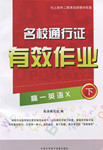题目内容
用方框中所给单词的适当形式填空, 使短文通顺、正确、连贯(每个单词限用一次)。
A Bag of Kindness
“Boys and girls, tomorrow I want you to bring a cup of macaroni(通心粉)for our craft class, OK?”These 1 from my teacher rang in my mind all evening. I was afraid of the next day because I knew we had no macaroni at home. Living in an alcoholic(嗜酒的)family, we never had too much of anything 2 beer bottles.
I went home after school. Where could I find macaroni? I knew that the local bottle shop gave ten cents for a beer bottle, so I decided to sell some bottles to get money for macaroni. I started to
3 the bottles. After selling those bottles, I earned eighty cents. Although I did my 4 ,I still had no macaroni for my craft class.
“Weren’t you 5 when I asked you to bring it, John?”my teacher asked.
I went red in the face. I didn’t know what to say and other children started laughing. Then a little girl, Rosalyn, who sat beside me turned to me and said, “You can have some of 6 .”She offered a bag of macaroni to me. The k 6 in her eyes made me cry and I ran out of the room. I 8 took her macaroni or thanked her for her bag of kindness. However, I often think about Rosalyn and the way she turned to save me t hat day. I used to spend a great deal of my life complaining and keep kind people like Rosalyn a 9 ,After that class, I 10 .I am grateful to all the people like Rosalyn that made this world a better place to live in.
【小题1】words
【小题2】except
【小题3】collect
【小题4】best
【小题5】listening
【小题6】mine
【小题7】kindness
【小题8】never
【小题9】angry
【小题10】changed
解析【小题1】 根据上文老师的话语萦绕在耳边,所以填 words
【小题2】老师让他们拿通心粉,但是作者出生在一个嗜酒的家庭,家里很穷。所以家里除了酒瓶没有什么其他的东西了。 所以填 except
【小题3】为了买通心粉,作者收集( collect ) 酒瓶,但是还是没有凑齐买通心粉的钱。 所以填 collect
【小题4】do my best 尽自己最大的努力。
【小题5】listening 根据这句话知道应该用过去进行时, was/were + doing
【小题6】根据文章坐在他旁边的一个小女孩对他说:“你可以用我的” 所以填形容词性名词 mine
【小题7】此空需要一个名词,又因题意可知填 kindness 善良
【小题8】根据下文作者既没有用通心粉也没有谢谢这个小女孩,而是跑出了教室。填 never
【小题9】分析句子结构 keep 后面要加形容词 所以填 angry
【小题10】那节课以后作者就发生了改变, 所以填changed 过去式

 名校通行证有效作业系列答案
名校通行证有效作业系列答案| 任务型完形填空:用方框中所给单词的适当形式填空,每个单词限用一次,使短文通顺正确连贯,将答案填写在题后的横线上。 | |
Life used to be fun for "teenagers". They used to have money to spend, and free time to while away (消磨). They used to wear teenage clothes, and meet in teenage coffee bars and discos. Some of them still do. But for many young people, life is harder now. 1. are difficult to find. There's not so much money around. Things are 2. , and it's hard to find a place to live in. Teachers say that students work harder than they used to. They are less 3. in politics, and more interested in 4. exams. They know that good exam results may bring them better jobs. Most young people worry more about money than their parents did twenty years ago. They try 5. less and save more. They want to be able to get homes of their own one day. For some, the answer to unemployment (失业) is to leave home and look for jobs in one of Britain's big 6. . Every day hundreds of young people arrive in London from other parts of Britain, looking for jobs. Some find jobs and stay. 7. don't, and go home again, or join the unemployed (失业者) in London. When you read the newspapers and watch the news on television, it's 8. to get the idea that British young people are all unemployed, angry and in trouble. But that's not true. Three quarters of them do more or less what their parents did. They do their best at school, find some kinds of jobs in the end, and get 9. in their early twenties. They get on well with their parents, and enjoy their family life. After all, if they don't, they 10. be British, will they? |
| 任务型完形填空:用方框中所给单词的适当形式填空,每个单词限用一次,使短文通顺正确连贯,将答案填写在题后的横线上。 | |
3._______ music instruments (乐器). Many 4._______ of music have developed. There are so many kinds of music and you may be 5._______ in some of them. Music has different 6._______ for everyone. It is 7._______ by the old and young, men and women. It can make people happy or sad. In our 8._______ world, radios and televisions offer us lots of music, giving us enjoyment, 9._______ in a music lesson or at a concert. Music means different things to different people. Music 10._______ to the whole world. |